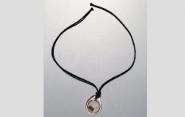From CEID To India, Khushi Baby Receives $200,000 Grant

Khushi Baby, a start-up company that began at the Center for Engineering Innovation and Design, has been awarded a $200,000 grant from the International Initiative for Impact Evaluation (3ie).
The company, which produces and is testing high-tech necklaces used for tracking medical information, received the grant as part of 3ie’s calls for projects designed to increase immunizations. 3ie is an international organization that focuses on developing effective policies for the poor.
The Khushi Baby device was developed as part of the course “Appropriate Technology in the Developing World,” co-taught by Dr. Joseph Zinter, assistant director of the CEID, and SEAS Lecturer Bo Hopkins. The focus of the course that semester was finding ways to improve vaccination delivery.
Ruchit Nagar ‘15, one of the company’s founders, said the company is currently conducting a randomized control trial in the Udaipur, Rajasthan, India in the rural northern region of India. About 120 mothers are enrolled for the phase I study. The award money from 3ie will help fund Phase II of the study, in which they will enroll close to 1,000 mothers and their children and follow them for about 15 months. This phase starts in June of 2016.
“We have a team of about 20 in India working on the ground,” said Nagar. “As we look at the phase II, this number may double.”
Khushi Baby is also one of the top 10 finalists for UNICEF’s Wearables For Good challenge, chosen out of 250 submissions from 46 countries. Earlier this year, UNICEF announced that it was seeking ideas for wearable sensor technology that serves people in resource-constrained environments. The winners will be announced in November.
The company has created a necklace for babies with a chip containing all of the baby’s medical information and vaccination records. Even without connection to a central database, health workers can scan the chip, see the health information and update it if needed. The device has reach in even the most isolated rural communities, which is crucial to the company's goals.
“The system is designed for mothers and children in the most rural parts, where current record-keeping systems are broken,” he said.
In some rural areas of India, parents are required to obtain and constantly update records of their children’s vaccinations. If lost or misplaced, health care workers have no way to verify that a child received a particular vaccination.
The Khushi Baby team, which also includes core members Preethi Venkat and Praneeth Sadda - both Yale-affiliated, also sees the device as a way of combining technology with tradition. They had originally designed it as a bracelet, but later changed it to a necklace to echo the black thread traditionally worn by children to protect them from nazar or the evil eye.

